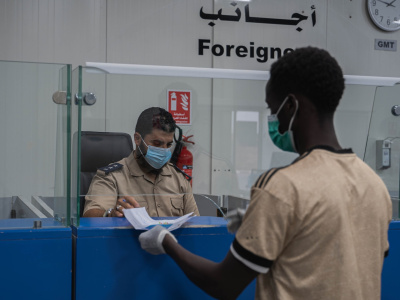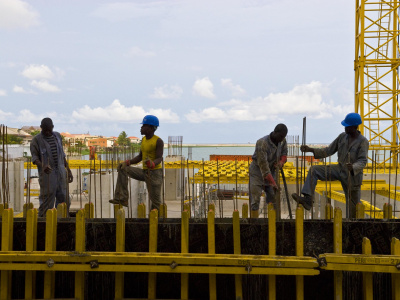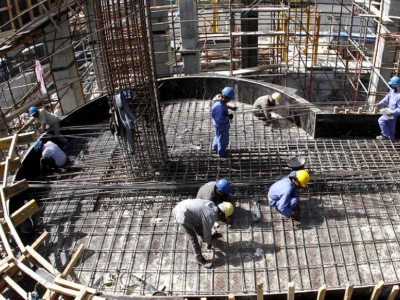
Europe and migration in 2019: Tough choices, conflicting priorities and existential questions
In the second post of our ‘Challenges Paper blogs’ series, Anna Knoll discusses how migration considerations are likely to take centre stage in a number of European policy processes in 2019, how it influences the relations with African partners and what trends we expect for 2019.
While in Africa the political year in relation to migration ended on a high note and with progress on regional and multilateral migration processes, it was a rather gloomier end in collective Europe. During the second half of 2018, nine European states withdrew their support of the Global Compact for Migration, a text carefully negotiated in an inclusive forum during the past years and agreed upon already in summer 2018. This not only reflected badly on the European Union and its member states as credible partners in international fora, it also demonstrated something more fundamental about policy processes in Europe. The normal sequence of technical coordination, rounds of negotiations and political debate, agreement and adoption may not hold anymore. The need for quick political gains can easily put a spotlight on sensitive issues and disrupt lengthy policy process right at the last minute. Fake or exaggerated news accompanied by social media strategies do the rest. In 2019 we will see a number of such policy processes in Europe, where inevitably diverging worldviews on migration will continue to clash. Beyond the struggle to find joint positions on migration, Europe will need to find new and better ways to communicate on these processes, to inform the wider public earlier and counter fake stories more forcefully.
Conflicting priorities
These political dynamics are likely to continue to take tolls on the well-being of migrants. While total numbers of irregular arrivals in the Mediterranean are at the lowest in five year, the death rate has increased. The political stand-offs and ad-hoc solutions for disembarkation of refugees rescued in the Mediterranean are continuing well into 2019. Last year’s attempts to find acceptable compromises to reform the Dublin II principle (which puts undue responsibilities on the EU Member states with external borders) all failed. There seems to be no clear solution on a way forward and this is not likely to change any time soon. Finding a more just and operational responsibility-sharing system for asylum applicants in Europe will thus remain one of the toughest priorities for the EU in 2019.
Negative public perceptions of the numbers of migrants arriving have fuelled more restrictive policies in the European Union and its member states. This is only one side of the coin: governments have to reconcile the promise to reduce arrivals with the need to invite workers from abroad to fill shortages in their own labour markets – whether it is Germany liberalising its immigration law, Poland admitting large numbers of Ukrainian to work and encouraging immigration from the Philippines or Spain increasing its annual seasonal labour recruitment from Morocco. The turn to legal migration pathways for migrant workers will be an equally important theme in 2019. This will have to go hand in hand with a debate about what kind of societies European nations want to be in the long-term.
Migration in EU policy processes
The debate about what societies we want to live in and what role migration plays is an existential and demanding one. For the EU it is easier to fight over processes than principles. So, not surprisingly, discussions over the ability of the EU to address migration internally and externally through its long-term budget (the EU Multiannual Financial Framework 2021-2027) are gathering steam. One way or another migration issues are set to play an important role: member states are likely to disagree over the level of resources earmarked for migration, the outline of activities and the extent to which migration-related conditionalities are applied to the external financing instruments. One of the tasks will be to keep a somewhat straightforward delineation and coordination between the EU’s internal instruments (which will be able to finance activities on migration externally as well) and the proposed single instrument for external action. Inevitable, during the long-term budget discussions, migration will be connected to other seemingly unrelated issues. Member States will make linkages to other aspects they care about, such as gender, climate change or sexual and reproductive health, and we may see interesting coalitions and ‘package deals’ developing as part of the negotiations throughout 2019.
Another key process gathering momentum in 2019 and where migration has been brought into the mix, is the post-Cotonou negotiation with African, Caribbean and Pacific partners. There are already substantial differences between African countries and Europe are on the nature of returns (voluntary vs. forced), operationalisation of readmission agreements, migration-related aid conditionality, and the weight given to migration vis-a-vis other important topics such as climate change or security, especially with regard to programming support funds. What may however be even more difficult from the EU side is to find internal agreement on how to frame migration. While the ACP Secretariat was hoping that the agreement could be a regional mechanism to implement the Global Compact for Migration, the European developments at the end of last year may have dashed these hopes. This does not mean that the EU cannot support the implementation of aspects of the Global Compact in partner countries, but it will be difficult to find acceptable language on migration within and between two parties in the political agreement steering the long-term partnership.
Influence of EU elections
The big question mark of these ongoing policy processes is linked to the results of the European Parliament’s elections in May 2019 and the composition of the new European Commission later in the year. Voices critical of migration and of the European and the multilateral agenda on migration, such as the Global Compact for Migration, will presumably become stronger and louder. Like in many of the national elections during the past years in Europe, different worldviews will clash and produce a fragmented picture, a clear illustration of the current divisions on the migration question. Migration will also be used to drum up political support. Hungary’s president Orban noted that for him success is if anti-migration parties win the European elections. The results of the elections will probably contribute to a further hardening of existing blocks. Whether and in what way migration issues will receive a prominent place in the new Commission will be one of the things to watch.
Africa beyond migration
Despite all the continuous emphasis on migration in European debates, 2019 will see more thinking in Europe on ways to foster the ‘real and equal partnerships’ with Africa that EU member states have been mentioning during past years. This means improving the dialogue with African partners on sustainable development and broadened opportunities for youth rather than only on migration. Some EU member states’ governments seem to have entered a competition among who is better at this. last years’ leaders summit in Austria, the 5+5 ministerial meeting in Malta at the beginning of this year, the current ideas in Italy by Salvini to devise a development plan for (or with?) Africa beyond migration and beyond aid are only few examples. However, the emphasis on development of Africa, while bringing a number of opportunities is not selfless. The turn to Africa is a more fundamental quest for Europe to ensure its own survival, not only due to fear of uncontrolled migration and instability from its neighbouring continent but also for future opportunities, be that investment or recruitment of labour. Such notions are increasing and may not be too far from what Europe’s founding fathers discussed when starting the European project: that Europe’s destiny is closely linked with Africa.
See here the previous blog of this series: ‘Win-win-win: Africa and Europe in 2019 should move towards solutions that benefit migrants too‘.
The views expressed are those of the author and not necessarily those of ECDPM.




